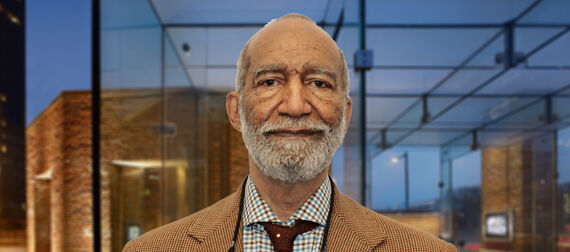by Michele K. Firkus
Ask Hayward Ford what he likes to grow in his garden and he'll say anything "beautiful and bountiful, just like my women." At 64, Ford, friendly, flirty and energetic, has been the driving force behind Aspen Farms Community Gardens for the past 30 years.
Aspen Farms, located at 49th and Aspen streets in West Philadelphia, is one of the premier gardens in the city, if not the entire country. It has been the subject of research projects and articles, and has won more than its share of awards and honors. After all its past success, could it be in trouble today?
Urban gardens in this area reveal a unique slice of history in this country, especially for its African-American communities. Philadelphia, a long-established manufacturing mecca, promised new opportunities and a way of life for former Southern sharecroppers and tenant farmers moving North during the Great Migration. Many of our senior residents share similar stories, and Ford is no exception.
After settling in West Philadelphia, Ford soon found his new home at Aspen Farms, which was about half the size it is now. Back then, gardens were a reflection of the neighborhoods -- African Americans in West Philly, white gardeners in Frankford. "Nobody was interested in diversity then," he claims.
"At the time," said Ford, "Aspen Farms was a group of people from the Mill Creek area. Everyone from Mill Creek was gardening. People were trying to make a living."
The garden, just like the collard greens, butter beans and Southern traditional foods, began to grow and flourish, and eventually caught the attention of Anne Spirn, a University of Pennsylvania landscape architect interested in the Mill Creek area. Through Spirn's work, funding from the University of Pennsylvania, grants from the city for work with local schools and input from budding architectural students, the garden "became the professional, world-class garden it is today. Anne Spirn was instrumental in making that happen."
But that's not all it took. In 1974, the Pennsylvania Horticultural Society (PHS) initiated Philadelphia Green, which provided support and eventual funding for growing urban gardens. Other green organizations, such as the Penn State Urban Gardening Program, also provided services to gardeners here in the city.
Ford fondly remembers his earliest involvement with Philly Green. "In the beginning, Blaine [J. Blaine Bonham Jr., former bank teller and current PHS executive vice president] would come out in his little seed mobile and thought he could teach us how to garden. We laughed him right out of there! After a few more tries, he realized we could teach him a lot more than he could teach us."
Over the years, Philadelphia Green and its relationship with Aspen Farms grew and strengthened. Thousands of urban gardens sprang up all over the city, aided by programs, services and events sponsored by Philly Green and PHS. Aspen Farms eventually became part of the Keystone Gardens program and received funding for new projects when they needed it. According to Ford, the reason Aspen Farms is what it is today is because of both the work of Anne Spirn and the continued support of Philadelphia Green.
But times have changed, and so has Philadelphia Green's commitment to urban gardens. The Keystone Gardens program, at one time boasting over a dozen premier Philadelphia gardens, now "really only supports about four or five sites," according to Ford, who also has been a longstanding board member for years. In addition, the kind of support they once provided has suffered. "You used to be able to get things like cyclone fencing, and now you can only get turkey wire. They've reverted back to what they were when they first started," Ford says.
He isn't worried, however, because Ford knows his garden is in a unique position, and that it's one of the lucky ones.
But other gardens have already suffered and will continue to suffer from receding support. In 2002, PHS eliminated six positions and people who supported projects at Philadelphia Green, including a landscape architect, the coordinator of the Citywide Improvement Grants program, which provided funding to existing community gardens and the Garden Tenders coordinator, who taught instructional classes for new gardening groups in the city. In April 2003, PHS announced it was doing away with the Harvest Show, which had been held consistently for the past 40 years. It also eliminated the plant sale, which provided low-cost plants and vegetables to gardeners with notes informing them they could still purchase cheap plants at stores such as Frank's or Wal-Mart.
Is the green future of gardening looking black? Despite the recent cuts, Ford is still optimistic. "In Philadelphia, gardening has such a solid foundation. It has a bright outlook as long as we can teach the youth to keep doing it. Every organization in the city is incorporating greenery in its site now. Philly is one of the greenest cities around."


